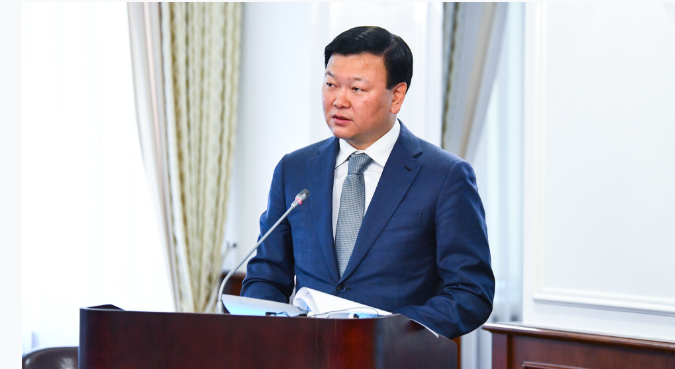NUR-SULTAN – The vaccine rollout in Kazakhstan has increased 1.6 times over the past week, from 254,000 to 405,000 people, said Kazakh Healthcare Minister Alexey Tsoy at a government meeting on Tuesday.

Minister Alexei Tsoy. Photo credit: Kazakh PM press service
“Vaccination of population is ongoing, around 5.2 million doses of vaccine have been administered. 3,246,795 people or 32.8 percent of the entitled population have received the first component and 1,954,372 people received the second dose,” said Tsoy.
He said vaccination facilities have sufficient vaccine doses, including approximately 800,000 doses of the first component and 1.4 million doses of the second one.
“Even taking into account the emergence of the Delta variant, and ongoing study of the effectiveness of vaccines against this variant, it should be noted that the vaccination has a positive impact on the epidemiological situation in the country,” said the minister.
Kazakhstan provides a choice between four vaccines to its citizens – Russia’s Sputnik V vaccine, locally produced QazVac vaccine, Hayat-Vax produced in the United Arab Emirates based on Chinese Sinopharm technology, and another Chinese CoronaVac vaccine.
Over 145,000 people in the Kazakh capital have been immunized against COVID-19, head of the city’s healthcare department Timur Muratov told an online press briefing on Monday. More than 210,000 received the first jab.
“To cover the population with vaccination, we have tripled the number of vaccination points in medical institutions, and their working hours were extended from 8 am to 10 pm, including on Sundays and holidays,” said Muratov. Trade malls are also deployed as vaccination facilities.
Kazakhstan has been in the red zone since June 26. Nur-Sultan and Almaty as well as West Kazakhstan, Atyrau, and Karaganda regions are in the red zone.
“Over the past week, the number of cases rose 39 percent. Occupancy of infectious disease beds is 27 percent and 24 percent at intensive care beds,” said Tsoy.
The surge in cases was driven by the cities of Nur-Sultan and Almaty, accounting for 43 percent of all new cases in the country.
In Nur-Sultan, sixty-five percent of infectious disease beds and 74 percent of intensive care beds are occupied. The city has been in the red zone for more than two months prompting the officials to tighten restrictions after the Delta variant reached the city.
The Delta variant, which was first identified in India in October 2020, is considered to be the most transmissible having a shorter incubation period and higher contagiousness. It has been identified in at least 85 countries causing COVID-19 surge worldwide, including in highly vaccinated countries, such as Israel and the United Kingdom.
